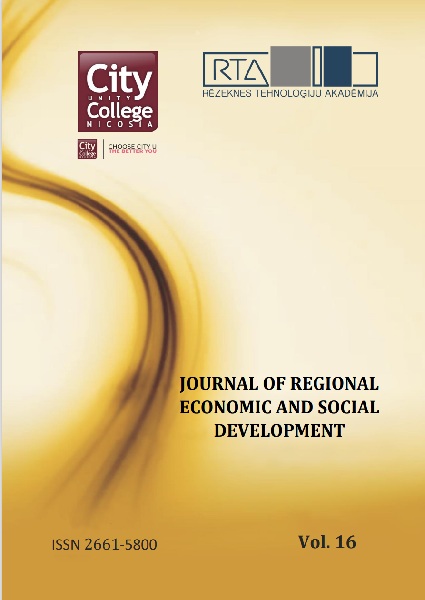REASONS FOR STRESS AMONG STUDENTS STUDYING BUSINESS STUDIES IN LITHUANIAN AND LATVIAN HIGHER EDUCATION INSTITUTIONS
DOI:
https://doi.org/10.17770/jresd2024vol16.8325Keywords:
business students, higher education institutions, stressAbstract
The purpose of the study: To identify reasons for stress among students studying business studies in Lithuanian and Latvian higher education institutions.
Methodology: The study covers two culturally close countries, as students studying business programmes at two higher education institutions in two countries were included. A quantitative research approach was used. Students’ stress level was assessed on 34 attributes. A 5-point Likert scale was used, with 5 being the highest level of agreement and 1 the lowest. Statistical analysis of the data was performed using SPSS 21 and Windows Microsoft Office software. Statistical methods used: descriptive statistics, Cronbach's alpha, Student's t-test, Anova test.
Main Findings: The study revealed that business students at Lithuanian and Latvian higher education institutions experienced the highest stress due to various academic factors. Stress among business students during their studies was a topical issue, and the expression of stress related to socio-demographic factors.
Originality: The survey was conducted using an authentic standardised questionnaire developed by the researchers, and the psychometric quality of the questionnaire was high.
Implications: The results of the study are useful for Lithuanian and Latvian higher education teachers and administrators to improve the psychosocial conditions of studies and reduce students' stress related to their studies.
References
Acosta, M. A. (2021). Exploring the acceptability of an improv-based workshop series for college student stress and anxiety. University of Hartford. https://www.proquest.com/docview/2546581733?pq-origsite=gscholar&fromopenview=true&sourcetype=Dissertations%20&%20Theses
Alkhawaldeh, A., Omari, O., Aldawi, S. A., Hashmi, I. A., Ballad, C. A., Ibrahim, A., Sabei, S. A., Alsaraireh, A., Qadire, M. A., & Bashtawy, M. A. (2023). Stress factors, stress levels, and coping mechanisms among university students. The Scientific World Journal, 2023, Article ID 2026971. https://doi.org/10.1155/2023/2026971
Baranauskas, M., Jablonskienė, V., Abaravičius, J. A., Arlauskas, R., & Stukas, R. (2020). Biomedicinos mokslų studentų patiriamo psichosocialinio streso ypatumai ir sąsajos su miego kokybe. Visuomenės Sveikata, 3(90), 59–65. https://www.lituanistika.lt/content/88381
Bendžiūtė, S., & Stanislavovienė, J. (2021). Aukštųjų mokyklų psichosocialinė mokymosi aplinka. Sveikatos Mokslai, 31(2), 40–45. https://doi.org/10.35988/sm-hs.2021.033
Graves, B. S., Hall, M. E., Dias-Karch, C., Haischer, M. H., & Apter, C. (2021). Gender differences in perceived stress and coping among college students. PLOS ONE, 16(8), e0255634. https://doi.org/10.1371/journal.pone.0255634
Hassel, S., & Ridout, N. (2018). An investigation of first-year students' and lecturers' expectations of university education. Frontiers in Psychology, 8, 2218. https://doi.org/10.3389/fpsyg.2017.02218
Ivancic, L., Perrens, B., Fildes, J., Perry, Y., & Christensen, H. (2014). Youth mental health report. Mission Australia and Black Dog Institute. https://www.blackdoginstitute.org.au/wp-content/uploads/2020/04/2017-youth-mental-health-report_mission-australia-and-black-dog-institute.pdf?sfvrsn=6
Kötter, T., Wagner, J., Brüheim, L., & Voltmer, E. (2017). Perceived medical school stress of undergraduate medical students predicts academic performance: An observational study. BMC Medical Education, 17, 256. https://doi.org/10.1186/s12909-017-1091-0
Mofatteh, M. (2021). Risk factors associated with stress, anxiety, and depression among university undergraduate students. AIMS Public Health, 8(1), 36–46. https://doi.org/10.3934/publichealth.2021004
Nakie, G., Segon, T., Melkam, M., Desalegn, G. T., & Zeleke, T. A. (2022). Prevalence and associated factors of depression, anxiety, and stress among high school students in Northwest Ethiopia, 2021. BMC Psychiatry, 22(1), 739. https://doi.org/10.1186/s12888-022-04393-1
Ribeiro, I. J. S., Pereira, R., Freire, I. V., de Oliveira, B. G., Casotti, C. A., & Boery, E. N. (2018). Stress and quality of life among university students: A systematic literature review. Health Professions Education, 4(2), 70–77. https://doi.org/10.1016/j.hpe.2017.03.002
Tsang, K. K., & Lian, Y. (2021). Understanding the reasons for academic stress in Hong Kong via photovoice: Implications for education policies and changes. Asia Pacific Journal of Education, 41(2), 356–367. https://doi.org/10.1080/02188791.2020.1772719
Tus, J. (2020). Academic stress, academic motivation, and its relationship on the academic performance of senior high school students. Asian Journal of Multidisciplinary Studies, 8(11), 29–37. https://doi.org/10.6084/m9.figshare.13174952.v1
Wuthrich, V. M., Jagiello, T., & Azzi, V. (2020). Academic stress in the final years of school: A systematic literature review. Child Psychiatry & Human Development, 51(6), 986–1015. https://doi.org/10.1007/s10578-020-00981-y
Downloads
Published
Issue
Section
License
Copyright (c) 2024 Viktorija Piscalkiene, Simona Jankauskaite, Rasa Vaitkiene, Daina Znotiņa

This work is licensed under a Creative Commons Attribution 4.0 International License.


